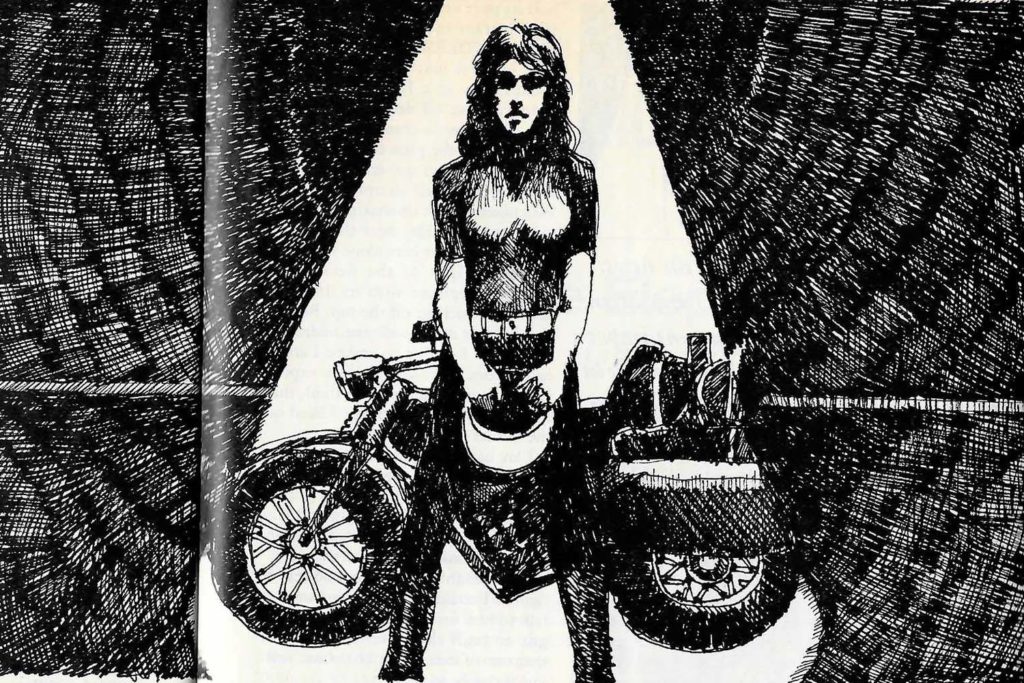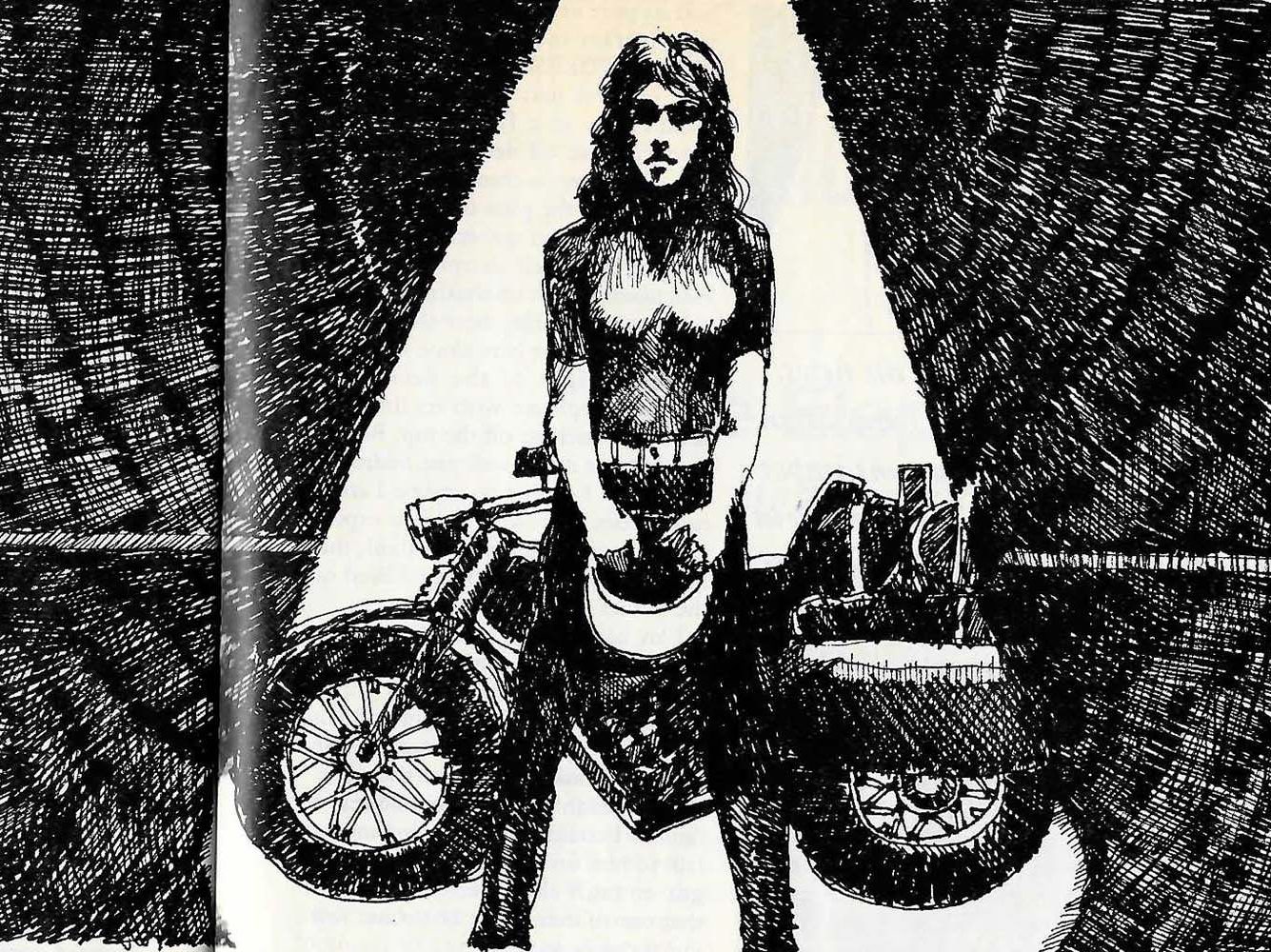
Sometimes you don’t know where you are, the name of the town or even the state. The place is located by days and miles. It is remembered by highway proximity. And by what kind of terrors gripped you there.
For me, that April night fell on day four. I had already passed through New Jersey, Pennsylvania, Virginia and North Carolina, finally stopping in Tennessee. Yes, that’s as far as I must have gotten. Near U.S. Highway 81. Days Inn.
After a little practice, divesting a motorcycle of all its luggage for the night and carrying it into a motel — three trips, including the tool pack with its 10 tons of lock, spare cables, liter of oil, roll of tape, tire tube, rain gear — doesn’t get any more fun. But such a trip, all alone, is about repetition as much as it’s about welcoming the blessedly new. I’ve always stayed at Days Inns or Knights Inns, make of that symmetry whatever you will, because a woman searching for lodgings after dark by herself is looking only for predictability and the guaranteed anonymity these places make it their business to provide.
After three days of telling myself different, the truth was coming through like green oxide on bogus silver: this wasn’t such a gas. My vacation, my proud declaration, my little adventure, was oppressing me as nothing before. I hadn’t suddenly become loquacious the minute I hit the road, the sort who meets locals at every way station and makes them fast friends over a bowl of chili, or gets invitations that start a new trajectory of discovery about the places passed through. I was still myself only more so, saying not much more than was necessary to purchase gas, coffee, a place to sleep, glossy post cards on which “Wish you were here” was written with no little urgency. Night would bring the same: take-out food eaten at the plasticized fake-wood veneered desk; a long bath to leach the cold from the bones; the local news indistinguishable from any local news anywhere; five hours before sleep to kill in the confines of the double-double-bedded room because continuing after nightfall pushed the stakes up a tad too high; a dose or two of Jack because of that.
I was feeling every one of the 975 miles that separated me from home. The most comfort I’d had was talking to my painfully estranged boyfriend, a mechanic, from a hotel room in Waynesboro, Virginia, the first night. Earlier in the day, stopping at a truck plaza after riding through two hours of the most imposing rainstorm I’d ever encountered, I’d noticed the box at the rear axle spewing the 90-weight oil that lubricated the shaft drive. My boyfriend was properly worried on my behalf and told me to seek out a bike shop in town the next day and have it checked out before I started down the Blue Ridge Parkway. The second deepest conversation I’d had in all the intervening time was at that shop, when four mechanics stopped to inspect my bike.
Now, near U.S. Highway 81, I spread the map out on the rigid bed and scanned it for some promise that I might make it all the way home tomorrow, three days before schedule. There didn’t seem much point in drawing it out longer, to look for more motels just like the last. I’d simply had enough of blissful solitude.
However I looked at it, though, the miles would collapse no further. There were at least 15 hours of holding the throttle open at a steady 70 mph etched in those lines, and it couldn’t be done — not by me at least. The force of the wind at that speed, the temperature, the buzzing, the constant watchfulness, the tension that crept up the neck, took it out of you too fast. You got more tired on a bike than you ever thought possible.
The days had grown so elongated that to look back on them seemed to be to glance into history: had it really been this same afternoon that I had ridden up the side of Mount Mitchell, parked, and ascended the lookout tower in the persistent wind that blows up there? Taking in the small exhibit room empty of visitors except for me, I read the placards that described Mitchell’s quest to prove that his mountain was actually higher than Clingman’s Dome, that it was in fact the highest spot in the East. Scrambling around on the desolate peak with his calibrators, he slipped and fell, perhaps dying instantly, perhaps waiting days for death in the cove of rocks. His was a bitter feud with Clingman, and his victory was posthumous. He lay now under the stones there, unable to give up his purchase on faith. At the height of my own futile journey, I realized that he and I were about the only people up here on this cold day, and he was dead.
I had known from my trip down this bucolic byway the previous October, legendary among motorcyclists, that the next stretch would take me farther into the Smokies, and that the higher I went, the lonelier the way. Then, though, I had simply felt alone, not lonely; I was with a man I was beginning to love. At that stage you welcome the height, the wide vista over uninhabited wild. It feels fine to be there and feel small, together. Now, the peculiar lunar landscape at 6,053 feet, the highest point on the Ridge, was crushing. The wind singing over the rocks had an edge of cruelty. I had climbed into the thinner air with my Guzzi’s beating engine without seeing but a car or two hurrying in the other direction, and the groups of riders I’d hoped to fall in with were still home, waiting for the next month and warmer air.
I wouldn’t let it stop me from going through the motions of marking my trip in the customary manner, and I stopped the Moto Guzzi in front of the sign that declared this the highest point in order to take the obligatory photo of proof. As I did so the lone man who had been standing, looking out over the view from the opposite end of the parking lot, came up behind me and told me I could get into the picture, too.
After handing my camera back he engaged me in a conversation that felt somewhat unreal: he told me his destination, his reason for being here in such an unvacationlike month, all the while glancing at my bike. As often happens, he informed me he used to ride, too, and asked me if the road was good for riding. My enthusiasm was a little forced – it certainly was, but I would have hardly known it from this experience. He said he wasn’t sure if he’d ever make such a trip alone, and he kept complimenting me on my bravery, though I wanted to correct his misapprehension so it could bear the more proper label: foolishness, a bid to prove I would have a grand time without anyone else at all.
But I couldn’t say it to this stranger. It took too much explaining, too much time-intensive shading between black lines. The simple version was more appropriate to this meeting, so I let him have it the way he wanted. He insisted on writing his name and address in my notebook, extracting a promise that if I ever passed through Iowa I’d look him up. I put it in my tank bag with an assurance that I would, while the knowledge that I wouldn’t sunk down hollowly inside.
There was nothing else to do but get on the bike and keep going, to the next mark on my map, the end of the Parkway in Cherokee.
On the prior trip, too, I had insisted on stopping in this gewgaw heaven, darting into stores on a restless search for the perfect ridiculous souvenir, tiring out my boyfriend until he cried uncle. He let me go on rushing from shop to shop while he waited outside by the row of glass windows that housed the Drumming Duck and the rattlesnake and the python and the rabbit clown and the other sad creatures on display for the visitors who paused a moment, pointed to the displays for their ice-cream-sticky children, then hurried on to buy their rubber tomahawks and beaded belts.
On this day I went looking again, having never found the perfection in plastic I sought, but after two stores I wandered back to my bike and glanced at the sky. It was getting late, and I needed to make it through the winding ways of the Great Smoky Mountains National Park with plenty of light. Besides, I had it in mind to visit Dollywood in Pigeon Forge, Tennessee, before nightfall.
Pressing on. I began seeing monumental billboards, on which a horrific, huge butterfly loomed, for the attraction miles before town, a formerly bereft Hamlet that had been Dolly Parton’s hometown before she made it big and it turned into a theme park of cheap restaurants and Western-wear outlets. I turned into the massive parking lot for the amusement park and saw the sign that informs two bucks is the price for parking; besides thinking that was steep for the few minutes I wanted to spend inside, I always resented paying anything to put such a narrow machine into a corner that couldn’t have been used by anything else anyway. Then I found out the admission was $18, and that clinched it. Who spent that much money to ride a ferris wheel alone? Shady characters in old movies did it, but they had ulterior motives. I could only turn around, another wistful goal having come in sight and revealed itself useless in plain view.
The sky was lower as I headed back out of Pigeon Forge, and I wanted to do it fast. I wanted to find somewhere I could be alone where no one would see me being alone. It was time to find the night’s Days Inn.
I hauled in all the garbage — the saddlebags, tank bag, helmet, tool bag. I went back down the hill to the service station’s convenience store and got some Italian rolls that were too white and too soft and a package of string cheese, thus exhausting their variety of real food. I sat in the bathtub and turned on the orange-red heat lamp so that the timer buzzed judiciously for 20 minutes. I unfurled the map and read it with a side of bourbon, so that some time in the future I might be able to fall asleep in the strangely familiar room. I made my peace as best I could with the discovery that I would have one more night like this, but I could do it. Since I had to, I could.
I turned on the news, and just when I was listening intently to some important-sounding item about the municipal airport of the nearby town I can’t recall the name of, I heard the voice.
It spoke in a stage whisper that reached to the fifth tier and back.
It said, “Tomorrow is the last day you will spend on earth.”
A shaking started in my gut, my feet felt very far away. The words of the anchorperson continued to accumulate in the room like cotton batting being stuffed into a mattress. Behind my eyes a scene was now projected, and I saw a white car of some general make coming at me and my white bike — a horror all dressed in the tones of clouds — but there the movie stopped, although I knew its end.
The utter precipitousness and incongruity of this final pronouncement made me unable to avoid its truth. I had apparently had one of those supermarket-tabloid premonitions: WOMAN FORESEES OWN DEATH.
It seemed just as certain that I couldn’t stay in a Tennessee motel in order to stave off death; the irony of that, I presume, is completely obvious. I reached for the glass of Jack Daniel’s and saw my hand quivering in midair. I spoke to myself sharply: Don’t be ridiculous! It kept on shaking.
It was intolerable, more than merely nettlesome, to be here alone now, and I caught sight of the decorator-almond telephone with its little red siren light sticking off the top. Besides the fact that it was well past midnight, how could I explain to anyone I could rouse from sleep what I’d just experienced? I was beginning to think that most of my friends thought I lived on the border of sanity anyway.
I lay back on the bed with a groan. Say, eight hours isn’t too long to spend lying here in the leaden grip of an absurd fear, until it’s light and you can go out and bravely prove the folly of your fantasies, shaking all the way.
If I couldn’t talk to anyone real, I figured I could make someone up and talk to him on paper; God knows I’ve got enough characters in my brain that one of them must be up and willing at this hour.
In the desk drawer were three sheets of motel stationery. Not enough, but a start. I took them back to the bed and started talking. We discussed why at this particular time I would be feeling afraid, why fear was often my co-pilot on my motorcycle. From the moment I’d bought my first bike three years before, I’d managed to pin most of my previously free-floating anxieties on some aspect of machinery. And wasn’t that why, later, I’d realized I wanted one in the first place, to wage war on this fear in the concrete?
At the bottom of the second page, the TV well into a rerun of “All in the Family,” the writing trailed off. I slipped into sleep and dreamt of nothing.
II
There is a beginning to this story, of course, far before the beginning. I was boarding at a prep school in Ohio, the town — a miniature replica of a New England hamlet replete with town green, white steeples, stone wall around a campus of gentle slopes and neatly tended playing fields — was midway between Akron, where I am from, and Cleveland. Although I had opted to attend (pleasing my father, who had also gone there) and escape public school for which I was decidedly not cut out, by my third year I was beginning to feel I had chosen another type of prison instead. I was blissfully happy up in the art room, a sun-filled kingdom ruled by the brilliantly eccentric Mr. Moos, but I was not allowed to spend all my time there as I would have wished. I had to do sports (for which I was equally woefully miscast), science, woodshop (which I flunked, for “refusing” to keep my plane sharpened), and, most loathesome of all, math.
No one has ever erred in calling me stubborn. I have a place, like the end of spring, beyond which I can stretch not a millimeter further. I hit that wall one achingly green spring day, on which I was not uncoincidentally expected in math class at 8:30 a.m. — stupefyingly early, to add injury to insult. I looked at the clock when I opened my eyes, saw it was 8:20 and pulled off the covers. I put on my jeans, forbidden in class, a T-shirt, and put my money and keys in my backpack. I wheeled my Raleigh 10-speed out the door, carried my prize possession bought with hard-won summer babysitting funds down the stairs and outdoors. And I rode past the streams of students heading up the brick walks toward school.
The trip took a half hour in the car. I was thankful in more ways than one that the direction was reversed this time. Approaching the quaint crossroads of Peninsula, a half-mile hill shot down into the town. I coasted, let the bike pick up speed. The wheels were flashing now in the sunlight. I couldn’t go fast enough; I shifted into tenth gear and pedalled as hard as I could, pumping, pumping. The wind dried my teeth clean so my lips stuck to them — that was because I smiled.
When I turned up the drive to my house my mother looked up from her gardening. She hardly seemed surprised to see me. Without her asking, I told her that I simply couldn’t take it anymore. She nodded, and we had some lunch. I think she must have called my father at the office, because when he came home he didn’t seem too stunned either. I was relieved, near elated. I could stay — we would work out the credits and whatnot later. We had the usual nice dinner my mother prepared. Then my parents rose from the table and announced it was time to get going.
Now it was my turn not to be surprised. I had achieved at least that much maturity to understand a certain version of reality.
The next day I was summoned into Sherwin Kibbe’s office. The school’s dean was a dead ringer for Norman Mailer, and he looked frighteningly out from under overhanging silver eyebrows and inquired just what I thought I had been doing. I was several pages into my explanation, which combined a bit of Jefferson with a smattering of Kerouac, when he cut me short. “Well, I think you just wanted to take a ride on a nice day.”
My deeply felt protests met with an offer of demerits and probation. Tears of misunderstood frustration coursed down my cheeks after I shut the door. My issues were high – how could he have leveled me with such an insignificant charge? It was contemptuous.
Sixteen years later and I still ask myself the same question. My answer is still stubborn. So why shouldn’t I run away because it’s a nice day? There is never a better reason.
III
I’d made it as far as the Delaware Water Gap in one day. I’d been riding for 13 hours, and it was now 1 a.m. I was strung out from the numbing consistency of the highways, the same speed, the light, persistent rain that shrouded everything in mist, just like my brain felt. If I could just stay awake and bear down hard enough, I could be home in another two hours.
It was just me and the long-haul trucks now, and nothing broke the dark outside my headlight beam. I didn’t know if I’d been riding for one day or 10. Time had no meaning, except that it was what had exhausted me. I probably could have gone on. Suddenly, though, a thought came into my head, a small distillation of all the biking horror stories I’d ever heard: I was outrunning my headlight’s visibility, and if there were a railroad tie across the lane, I wouldn’t see it till it was too late. I was awake enough to appreciate what that meant.
In a few miles I saw the green Holiday Inn sign rise above the gloom of trees. In the office the woman behind the desk gave me a wide-eyed look as I clomped in in my rainsuit. No, no rooms, all full; there was another place 20 miles away — she’d call. No room in that inn, either, she informed me on putting down the phone. I felt at that moment I was going to collapse.
Actually, she considered, there was one, but the air conditioning had gone out in it. If I didn’t mind….
No, I didn’t. A couple of hay bales would have sufficed. I fell asleep in moments in the sickly, still air.
It was still raining in the morning, and I jerked on the same still-wet clothes and covered them up with the rubber-lined suit. I got an early start.
Two hours later I made the last turn onto my street, and for the first time was forced to slow to a near halt. It had stopped raining. The sun was calling up the hot moisture from the pavement to choke the air. Halfway down the block an earth-mover and police barricades barred the way. Workmen were sweating in their undershirts. I felt the heat rise up from the Guzzi’s cylinders and envelop me. I was wearing a long-sleeved shirt, sweatshirt, jeans, leather jacket with winter lining, rainsuit on top of that; my hands were encased in rubber gloves with a thick synthetic liner, and the vents on my helmet were closed against the early morning chill that was an incredible memory now.
The men tried to wave me to a stop. Instead I let out the clutch and came toward them, provoking wilder gesticulations. At the last moment, I jumped the curb onto the sidewalk to pull up in front of my garage. Only then did I apply the brake.
I switched off the key, then pulled off my helmet and sat for a second, steam rising around my neck. The bike let out its little clicks and coos, already cooling in the heat.
This is how 2,000 miles ends. I’d made bigger trips, but not alone. There was a certain purity to this one, a perfect insularity. It was as though I had done all that distance without leaving a mark on any atom in the universe. I had slipped quickly and quietly by, and the wind in my wake only a vague memory of disturbance in the grass by the edge of the road. Maybe we were white dream-cars ourselves. Yet now I was home, and that’s all that mattered.
* * *
For more from Melissa Holbrook Pierson, visit her website. You can also listen to our interview with Pierson on the Rider Magazine Insider Podcast.














